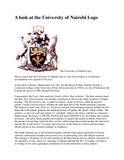A look at the University of Nairobi Logo

View/
Date
2014Author
University of Nairobi
Type
ArticleLanguage
enMetadata
Show full item recordAbstract
Did you know that the University of Nairobi Logo is very closely linked to its historical development over a period of 50 years?
At the dawn of Kenya’s Independence in 1963, the then Royal College Nairobi, became a constituent College of the University of East Africa and only in 1970 by an Act of Parliament did it attain the status of a fully fledged University.
Consequently, the Logo, when analyzed closely, reflects that evolution. The three animals depict the three East African nations who initially contributed to the growth of this institution of higher learning. The lion panthera leo, a symbol of dignity, stands for Kenya, while the graceful giraffe, Giraffa Camelopardalis, holding the right hand side of the shield represents Tanzania. The elegant crested crane, Balearica regulorun currently and endangered species holding the left hand side of the shield, portrarys the landlocked state of Uganda, the ‘pearl’ of East Africa. The giraffe is a call to all staff and students to “aim high” whereas the chains with the two miniature shields depict the beauty of TRUTH, PEACE and mutual RESPECT for all learning and teaching processes. The green shield signifies the readiness to support and defend academic freedom in the pursuit of knowledge while the three torches with burning flames indicate that, the University must be the “torch bearers” of society and protectors of the flame of wisdom and knowledge, should anyone in any situation endanger its brightness.
The black academic gown and red hood together with the white degree parchment roll mean scholarly achievement attained after several years of painstaking study and diligent research. The clasping of the Book of Life and Learning by the three human persons indicate education for all, regardless of race, creed, sex, language or religion through the 3R’s of reading, research or re-writing of new ideas, paradigms and initiatives for dissemination to policy makers, administrators and educators. The central and most important focus are the people who are the greatest asset in developing the nation. Every staff member and student must strive to eradicate poverty, ignorance, illiteracy by the search for truth, academic excellence and upright moral conduct.
The art of learning is portrayed by the fabulous Datura or “Morning Glory” blaring out its message of hope and the need to use our brains and hands to think independently and act courageously and with vision, directing the destiny of our people.
All the above elements are supported by “Mother Earth” with the green plants and red flowers pointing to the safeguarding of a sustainable environment and the rock of human values: caring, sharing, warmth, security, togetherness, tolerance and acceptance. Engraved on the rock is the motto written in Latin: “Unitate et Labore”. This means “unity and work” all staff and students must be loyal people building bridges of love not fences, and promoting unity at all times. Unity in purpose is based on humility in order to achieve the three objectives of a university education. These are: to conduct research leading to the accumulation, transmission and dissemination of knowledge and understanding; to provide skilled manpower for government, business, industry, agriculture and other sectors of the economy; to participate in the maintenance of high academic standards.
Work is a magnificent reality and work well done is a service to society. With prayer it can be converted into a work of God, a labour of love “People are born to work with dignity and peace but perseveringly using time efficiently in order to meet the challenges of nation building, thus making positive contribution to the social and economic well-being of all Kenyans.
Publisher
University of Nairobi
Collections
- Featured News [171]
